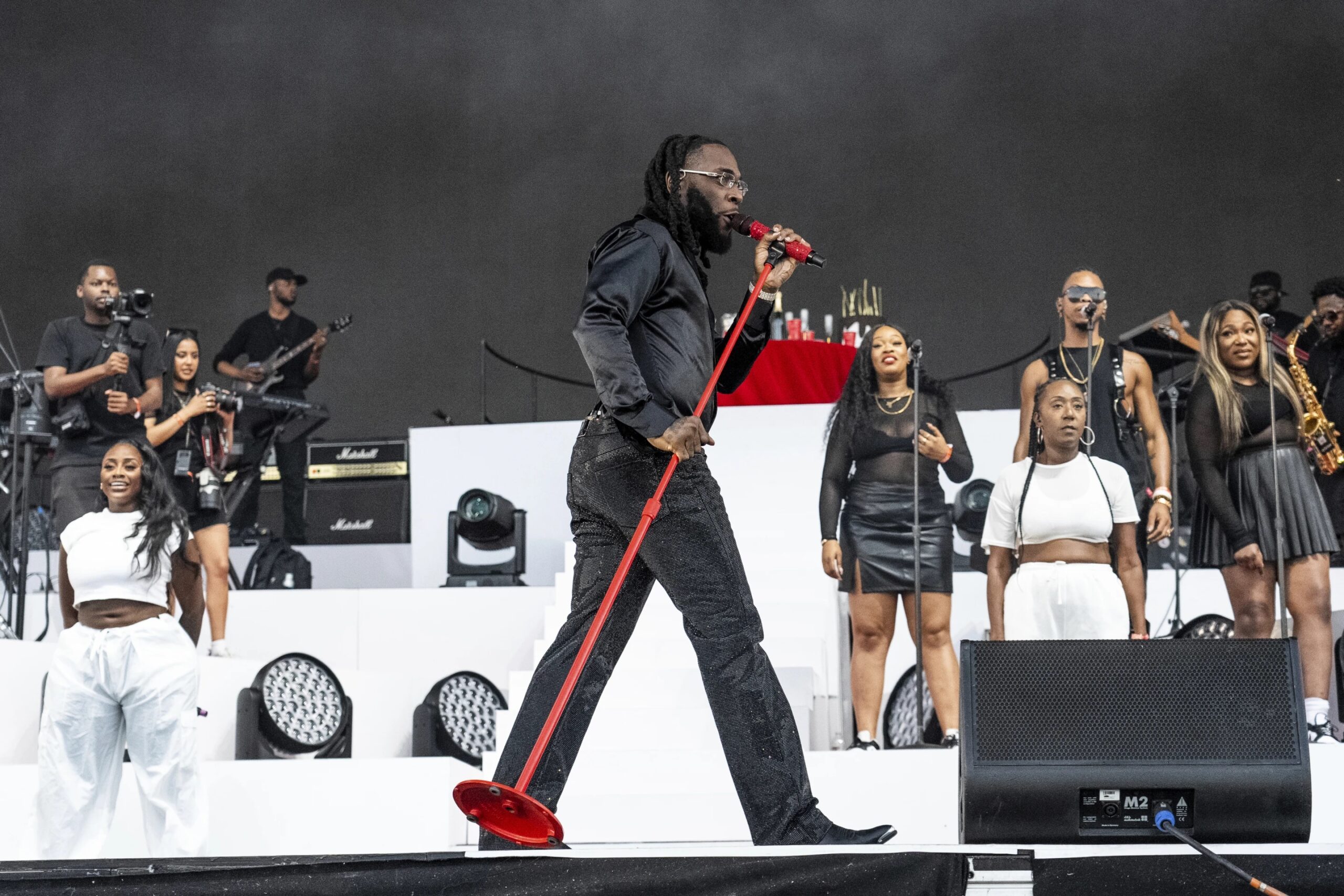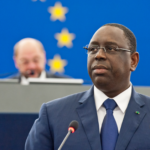ABUJA, Nigeria (AP) — From an electrifying and colorful musical performance at the FIFA World Cup to a new Grammy Awards category, African music genres and talents are reaching audiences and dance floors across the globe in a breakthrough for an industry that has long endured structural challenges.

With performances on the world’s biggest stages and record numbers on global music charts, African acts are charting a new course for music produced on the continent, taking advantage of high-profile international collaborations, a boost from the internet and streaming platforms, and new investment opportunities.
A new Grammy — best African music performance — will be awarded Sunday, highlighting regional musical traditions and recognizing “recordings that utilize unique local expressions from across the African continent.”
“For a musician, the Grammy is a worldwide nod for your accomplishment and hard work — that we hear you and we see you on the world stage,” says LeriQ, a Nigerian producer and force behind Burna Boy’s Grammy-winning “Twice As Tall.”
FROM AFROBEATS TO AMAPIANO
Sub-Saharan Africa was the fastest-growing region for recorded music revenues in 2022, according to the International Federation of the Phonographic Industry’s Global Music Report 2023.
At the center of that growth are newer genres of Afrobeats — the renowned blend of distinct West African music styles — and amapiano, which fuses South African kwaito with African jazz, house music and soulful vocals.
There is also Afrobeat — different from Afrobeats — a blend of jazz, funk and traditional West African rhythms popularized by Nigerian musical icon and political agitator Fela Kuti in the 1970s. Then there’s Afropop, a rich variety of contemporary styles. The traditional soukous dance music out of Congo and other parts of Central Africa. The rhythmical and heavily vocal shaabi and chaabi heard on the streets of North Africa. Kenya’s benga and Tanzania’s bongo flava reverberate across dance floors in East Africa, just as fuji and high life do in West Africa.
Streaming platforms are helping push the genres across borders and continents. On Spotify alone, Afrobeats streaming has grown by more than 500% since 2017, according to the platform.
Nigerian artist Rema’s “Calm Down,” featuring Selena Gomez, is not calming down. The 2022 track became the first led by an African artist to hit 1 billion Spotify streams and has the record for the most weeks — 64 — spent on Billboard’s Pop Airplay chart.
One key factor in how “Calm Down” and other such Afrobeats songs have grown lies in how they mirror daily lives through a mix of Pidgin and local languages, melodies, drum patterns, heavy rhythms and poetic style, says Joey Akan, founder of Afrobeats Intelligence newsletter.
“And so now we’re having people dancing and screaming things like, “I need ‘igbo’ and ‘shayo,’ — that is, ‘I need marijuana and alcohol,’” Akan says, referring to the chorus of Burna Boy’s 2022 hit “Last Last.” “That’s what it is. ‘I need marijuana and alcohol because I’m having a heartbreak.’”
South African sensation Tyla’s “Water” cemented the ascendance of amapiano, making the artist the highest-charting African female solo act of all time after peaking at No. 10 on the Billboard Hot 100.
And some tracks meld the genres under the African music umbrella.
“If you listen to the song ‘Unavailable’ by Davido (from Nigeria) and Musa Keys (from South Africa), which has been nominated for a Grammy, it is possibly an example of a perfect Afrobeats and amapiano cross-border collaboration,” said South African club and radio DJ Nafy Dread.
AFRICAN CULTURE AND EXPERIENCES ON THE GLOBAL STAGE
In the last year, soccer’s biggest stages have featured African stars, from Burna Boy, who thrilled Istanbul’s Atatürk Olympic Stadium during the UEFA Champions League final, to Rema, who entertained the world’s greatest players at FIFA’s Ballon d’Or event, to Davido, who was on the official FIFA World Cup soundtrack.
“A lot of the music we love today that’s outside of Africa originated or had a root in African music,” says Tina Davis, president of Empire, a digital media distribution company that works closely with Grammy nominee Olamide’s YBNL record label.
Five-time Grammy winner Angélique Kidjo is one of the continent’s greatest exports, with 16 albums to her name.
“The new generation of artists coming from Africa are going to take you by storm, and the time has come,” the Beninese singer said in 2020, upon winning the best world music album Grammy (a category since renamed).
That storm also comes with the strength of Africa’s numbers.
The continent’s young and culture-savvy 1.3 billion people will make up a quarter of the world’s population by 2050. Nearly half of Africans who migrated from their countries of origin live in a different region, according to Pew Research, each taking African melodies and tunes along.
That reach is particularly interesting considering that African music is produced for its people, embodying all aspects of their lives from their culture and experiences to their struggles, LeriQ says.
When they are not blasting through speakers at clubs and bars, the songs have become the megaphones blaring against repressive governments and unjust societies.
Hip-hop artist Nay wa Mitego used his 2023 single “Amkeni” to tackle alleged corruption and bad governance in Tanzania. Burna Boy’s “20:10:20” told the chilling story of how security forces opened fire on Nigerian youths protesting police brutality, just as Folarin Falana’s “This Is Nigeria” mirrors a society whose citizens are growing poorer amid vast mineral resources and oil wealth.
“With the kind of society we are in, you can understand why music is not just for entertainment but serves other interests depending on your condition and needs,” says Chika Anene, a designer living in Abuja, Nigeria, who says she can’t live without music.
STILL A LONG JOURNEY AHEAD
Amid increasing global appeal, institutions and individuals are more willing to commit resources to the development of local talents and infrastructure, industry insiders say, with increasing attention from major record labels.
The internet has also played a key role in growth and can continue to do so if properly utilized, analysts say. The continent leads mobile device web traffic in the world, according to the U.S. International Trade Administration, translating to more market opportunities for artists.
For one, the internet has democratized African music by removing the concentration of power from the hands of gatekeepers who wanted music from the continent to “sound a particular way” and enabled artists to put out what they want and audiences to seek what they want, says Kenyan musician Eric Wainaina, who sings benga-influenced social justice songs.
Still, it remains an uphill task to produce music on the continent, owing to challenges like limited funding and infrastructure that sometimes require reliance on foreign companies for development and promotion, says G’bemi Ereku, a Lagos-based entertainment and media executive.
“Our global appeal is not at its peak yet because of structural problems, in the sense that no tree can grow bigger than its environment,” says Ereku.
The continent’s population notwithstanding, there is still limited purchasing power — its projected music streaming revenue this year is around $410.7 million — less than 4% of the United States’ expected $12 billion, according to the market research firm Statista.
Nigeria — seen as the bastion of Afrobeats — does not have a music arena with a capacity above 6,000, reportedly one of the reasons for last year’s cancellation of the Afro Nation Festival, the world’s biggest Afrobeats festival, that was to be held in Lagos.
Even fast-rising talents like Nigerian artist Jhello find it difficult to break into the highly competitive industry with little institutional support.
“There is a lot of talent on the streets but what sets you apart from the others is branding, which currently takes a lot of effort and resources,” says Jhello.
Still, the music is finding resonance with people around the world.
“The world has discovered that there’s a new way to approach music … that hits you, gives you a new emotion, gives you new feelings, gives you a new experience,” says Akan of Afrobeats Intelligence. “And they like that experience.”
A beginner’s playlist of the global hits from Africa
2024 best African music performance Grammy nominees:
- “Amapiano,” Asake and Olamide
- “Rush,” Ayra Starr
- “City Boys,” Burna Boy
- “UNAVAILABLE,” Davido, featuring Musa Keys
- “Water,” Tyla
From South Africa:
- “Imithandazo,” Kabza De Small and Mthunzi, featuring Young Stunna
- “Fatela,” Aymos and Ami Faku
From East Africa:
- “Enjoy,” Jux, featuring Diamond Platnumz
- “Suzanna,” Sauti Sol
- “Kwikwi,” Zuchu
From West Africa:
- “Calm Down,” Rema, featuring Selena Gomez
- “Do Yourself,” Angélique Kidjo, featuring Burna Boy
- “Party No Dey Stop,” Adekunle Gold and Zinoleesky
___
Mureithi reported from Nairobi, Kenya, and Magome reported from Johannesburg. AP Music Writer Maria Sherman contributed reporting from Los Angeles.







